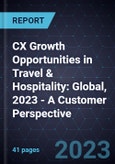Pent-Up Demand Compels Businesses to Invest in AI and Automation
The Travel and hospitality (T&H) industry was one of the hardest hit by the COVID-19 pandemic starting in 2020. Strict shelter-at-home regulations and travel restrictions created havoc for customer experience (CX) organizations globally, generating loads of new and perpetually changing information that T&H agents needed to have at their fingertips.
During the early stages of the pandemic, T&H contact centers were bombarded with cancellations. In 2021 and 2022, travel plans accelerated as worries about the virus began to diminish. The year 2023 is seeing a tremendous rise in travel due to pent-up demand. This means the T&H industry is once again overwhelmed with customer interactions.
The extraordinarily long wait times to reach agents during the early period of the pandemic forced customers across generations to use self-service customer interaction channels. Preparing for a post-pandemic future is top of mind for T&H companies, as they must navigate cyclical demand for travel with an ever-changing balance of live agents and self-service.
Many companies have invested in contact center solutions that allow customers to choose to receive a callback when an agent is available without losing their place in line. Or even better, the system can automatically identify the caller with their phone number, quickly confirm their identity for security purposes, and then proactively ask the customer if the call is regarding an existing reservation departing from the XYZ airport.
The difference between these two experiences will be much more evident in 2023 as companies procure intelligent virtual agents that can complete some interactions entirely on their own. They can also support agents by providing the most relevant information at their fingertips, allowing them to better connect with customers and offer them personalized recommendations.
Sustainability and corporate social responsibility (CSR) remain major executive priorities because consumers and investors demand them. In the publisher's 2023 Global Contact Center Survey, conducted in January 2023, 63% of contact center stakeholders in travel and hospitality considered sustainability very important or crucial. Virtuoso polled about 300 affluent travelers in May 2022 and found that 80% of respondents felt that the pandemic made them want to travel more responsibly in the future.
Throughout the decade, new interaction channels emerged, including refreshed interactive voice response (IVR), bots, more intelligent virtual assistants (IVA), and branded mobile apps and websites.
In an industry that has suffered from meeting baseline expectations with long queues and bots and IVRs that do not understand or deliver what the customer needs, a minimum requirement and a significant step towards brand loyalty is to make the interactions effortless and seamless across channels. About 67% of T&H contact center stakeholders focus on managing the entire customer journey.
Key Features
The primary goals of online customer survey of contact center IT decision-makers and leaders were to:
- Understand the IT challenges contact center organizations face today
- Gauge remote/hybrid models
- Monitor the status of digital transformation in contact center organizations
- Assess the current and future use of contact center solutions
- Evaluate factors that drive investments in contact center solutions
- Gauge market and technology trends
- Appraise available IT budgets
Table of Contents
Companies Mentioned (Partial List)
A selection of companies mentioned in this report includes, but is not limited to:
- Cathay Pacific
- Foundever
- Global Hospitality Group
- Teleperformance
- Tripadvisor
- Virtuoso








